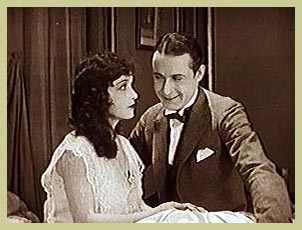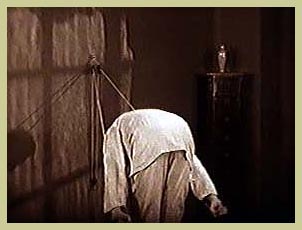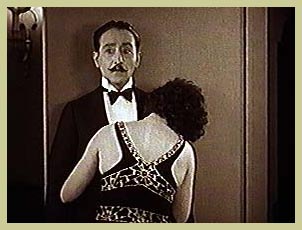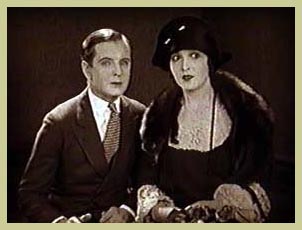

Warner Brothers
Cast: Monte Blue (Dr. Franz Braun), Florence Vidor (Charlotte Braun), Creighton Hale (Dr. Gustav Mueller), Adolphe Menjou (Professor Josef Stock), Marie Prevost (Mizzi Stock), Harry Myers (a detective), Dale Fuller (a nervous woman).
Dr. Franz Braun and his wife, Charlotte, have the perfect marriage. Prof. Josef Stock and his wife, Mizzi, have a terrible marriage.
 When Charlotte learns that her old friend,
Mizzi, has moved to Vienna, she invites her to come over for a
visit and meet her new husband. When Dr. Braun home, Mizzi realizes
this is a man she flirted with in a taxi cab earlier in the day.
Later, when Mizzi returns home, she calls Charlotte claiming she
needs to see Dr. Braun as a result of a fainting spell. At Charlotte's
insistence, Dr. Braun goes, but very reluctantly.
When Charlotte learns that her old friend,
Mizzi, has moved to Vienna, she invites her to come over for a
visit and meet her new husband. When Dr. Braun home, Mizzi realizes
this is a man she flirted with in a taxi cab earlier in the day.
Later, when Mizzi returns home, she calls Charlotte claiming she
needs to see Dr. Braun as a result of a fainting spell. At Charlotte's
insistence, Dr. Braun goes, but very reluctantly.
Mizzi, continues her pursuit of Braun, so he sends her a note stating that she should seek the assistance of another doctor for her ailment. She arrives at his office and tears up the note. Braun's associate, Dr. Gustav Mueller walks in on them in the middle of a one-sided embrace, but he is actually happy about the situation since he has been in love with Braun's wife for quite some time. To further complicate matters, Charlotte arrives at the office for a visit. After Mizzi, leaves, she goes in her husband's office only to find a broken vase on the floor, Braun's hair tousled, and a woman's scarf left behind. Thus begin her suspicions about her husband's fidelity.
As the story progresses, Professor Stock hires a detective to "tail" his wandering wife, and Charlotte encourages Mizzi's attentions to Braun not realizing she is "the other woman," but, instead, hoping that, as a close friend, she can help their marriage.
So much has been said about the "Lubitsch touch" in film histories and reviews, and this film is a prime example - filled with many of director Ernst Lubitsch's little "touches" that enhance the story so well. Lubitsch wastes no time in showing us his fine hand in the subtleties of direction with the opening sequence where Prof. Stock and Mizzi begin their morning.
Immediately, the status of the Stocks' marriage is made evident and the mood of the story is set. First, Stock puts on a sock that has a hole in the toe. He goes to his dresser drawer for another pair only to find it empty save for several starched collars. Mizzi, indifferent to his needs, closes his drawer and opens hers to reveal a wide array of hosiery from which to choose. She goes back to the bed where his clothes are laid out for the day. She removes them from the bed and literally throws them to a nearby chair. Unperturbed, Stock hangs a small mirror for his morning shave. Once he turns his back to lather, Mizzi takes the mirror so she can primp.
Through all of this, Stock is portrayed as most indifferent and unruffled by his wife's rudeness. However, when he declines to accompany her to the Brauns' for a visit, she warns that his "cruelty" will drive her away one day. Then, after a moment's pause, she adds, "That's just what you want, but you'll not get rid of me so easily."
An absolute gem of a "Lubitsch touch"
ends this scene. Stock has been exercising with one of those wall-mounted
 pulley/weight systems - facing the wall and pulling
back and forth to work out his arms. Mizzi has left the room,
but returns for one last barrage of anger directed at her husband.
The camera shows her spouting her venom, then switches to Stock,
his back turned to her, pulling at the weights and bending over
each time he does. It's as if he's telling her to . . . well,
it's obvious the message that is intended!
pulley/weight systems - facing the wall and pulling
back and forth to work out his arms. Mizzi has left the room,
but returns for one last barrage of anger directed at her husband.
The camera shows her spouting her venom, then switches to Stock,
his back turned to her, pulling at the weights and bending over
each time he does. It's as if he's telling her to . . . well,
it's obvious the message that is intended!
And there's more. For example, when Mizzi visits Charlotte for the first time, she finds her at the piano playing a piece entitled "I Love Thee." Later, when Dr. Braun arrives, Mizzi continues to flirt with him behind Charlotte's back. Playfully, she takes the music from the piano, holds it in front of her so he can see the title clearly, and twirls around on the piano stool, reveling in the discomfort Braun is feeling.
An delightful sequence of near-misses, misunderstandings, and neat twists occurs during the dinner party given by the Brauns. After Charlotte's upsetting visit to Dr. Braun's office, the couple have made up and prepare for a pleasant evening with a large number of friends over for dinner. Charlotte has set the placecards out and intentionally seats Mizzi beside her husband. When Braun notices this, he moves Mizzi's card down a few places and replaces it with a card for a Miss Hofer. Charlotte sees this and immediately becomes suspicious. She replaces the cards to their original order which Braun accepts.
At the dinner party that night, Charlotte tells Mizzi about the incident with the placecards. Mizzi gets an idea, and furtively places Miss Hofer's card back beside Braun. When everyone is seated, Charlotte, who is at the head of the table next to Mueller, notices who is seated beside Braun and, thinking Braun switched them back, becomes very jealous and angry. This sets the stage for an evening that goes from bad to worse for Braun.
One could go on and on about the direction of this film which is among the finest of the silent era. William K. Everson referred to Lubitsch's "silken elegance" which aptly describes the direction of "The Marriage Circle." This film continues to affirm what can be done with silent film in the hands of a talented director and talented actors, actually giving a refinement and artistic flair that is difficult, or maybe impossible, in a sound film.
And speaking of talented actors, each cast member does a superb job.
Supposedly, Thomas Meighan had been originally approached to play the part of Dr. Franz Braun and turned it down. As wonderful an actor as Meighan was, it is doubtful he could have pulled off the clueless victim of vamping as well as Monte Blue. As George Katchmer noted (Eighty Silent Film Stars, McFarland and Company, Inc., 1991), "He was not considered a handsome man, but he had the magnetism that attracted people." Katchmer went on to note that although Blue was a second choice for the role, "He played one of the best parts of his career." The New York Times gave high praise to Blue's performance. "Monte Blue rises to every possibility in a role that requires an abundance of expression. One moment he is laughing, the next surprised, then angry and finally fearful. His wonderful elasticity of countenance and ability to give a real idea of his feelings is a feature of this amusing and intensely interesting photoplay."
As always, Adolphe Menjou is "splendid,"
as noted in the Times  review. Quite often,
someone's performance in a silent movie is praised for its "restraint,"
but in this case, restraint is exactly what is required, and Menjou
does it well while projecting the inner workings of the character
and what he it out to accomplish. As noted, throughout the rudeness
and chiding of his wife in that opening sequence, Menjou's Professor
Stock is unruffled, staring sometimes blankly at his wife, and
then, in her absence, smiling cunningly as if he knows he will
win out in the end. These subtleties are necessary and help us
not only like, but admire the character as he carries out his
plan to rid himself of an unfaithful and unloving wife with tact,
caution, and yes, restraint.
review. Quite often,
someone's performance in a silent movie is praised for its "restraint,"
but in this case, restraint is exactly what is required, and Menjou
does it well while projecting the inner workings of the character
and what he it out to accomplish. As noted, throughout the rudeness
and chiding of his wife in that opening sequence, Menjou's Professor
Stock is unruffled, staring sometimes blankly at his wife, and
then, in her absence, smiling cunningly as if he knows he will
win out in the end. These subtleties are necessary and help us
not only like, but admire the character as he carries out his
plan to rid himself of an unfaithful and unloving wife with tact,
caution, and yes, restraint.
Menjou's best scene is when he tells Braun he knows of his tryst the night before with Mizzi. Although Braun denies this, Menjou's character is perfectly calm with a knowing smile gracing his countenance throughout. Finally, after Braun sees the detective's report, he admits his guilt, but insists the visit was entirely innocent. Menjou (Professor Stock), still maintaining that smug smile, replies sardonically, "I believe you, but nobody else will, and I'm delighted to have a man of your standing help me get rid of my wife."
Florence Vidor is as beautiful, charming and dignified as ever. Oddly enough, although the Times review praises Menjou, Blue, Hale and Prevost, it fails to mention Vidor's performance, a sad oversight. She is an excellent choice for the part of the devoted wife who is almost giddily in love with her new husband. She is given the opportunity for jealous indignation, tears of sadness at the indiscretions of her husband, fretfulness over her husband's disappearance, and righteous superiority as she "teaches her husband a lesson" - all of which she carries off extremely well.
Creighton Hale was a perfect choice for the wimpy, love-struck puppy role of Gustav Mueller, Dr. Braun's associate who is in love with Charlotte. His small stature in comparison to Blue, who towered above Hale by at least six inches, adds to the effect, especially when Hale portrays fearfulness that Braun is aware he stole a kiss from Charlotte the night before. After that mistaken kiss, he professes his love for Charlotte, but she turns him gently from the house, and Hale appears as a pathetic little boy who has just been spurned the affections of his first love. He also has opportunity on at least two occasions in the movie to exhibit the stoic horror of a small child who has been caught in a misdeed, which does so well.
Mention of Marie Prevost has been saved
for last because hers is the standout performance in the film.
Even Ernst Lubitsch thought so. In an anecdote related by author
Charles Foster in Stardust and Shadows (Dundurn Press,
2000), Lubitsch commented to Jack Warner, whose studio financed
"The Marriage Circle," "It is unforgivable that
she is not billed as the number one star of my film. Marie Prevost
is one of the few actresses in Hollywood who know how to underplay
comedy to achieve the  maximum effect. She stole every scene
in my film."
maximum effect. She stole every scene
in my film."
Warner, Menjou and Vidor were upset by the comment. Monte Blue was the only one who agreed with Lubitsch. According to Foster, Warner let Lubitsch know in no uncertain terms that he alone decided who the stars were in his films, and this episode was the beginning of the end for Prevost's career.
In viewing the film today, it is easy to see why Lubitsch said what he did. The role of Mizzi would be the envy of any star, and Prevost played it to the hilt. The New York Times said, "Marie Prevost is just the girl for the part," and she most certainly was. Her vivacity, flirtatious eye-batting, and coyly pouting mouth are key to the role, and it's easy to see why Blue's Dr. Braun had to give in to her charms on at least one occasion during the pursuit.
"The Marriage Circle" was something new to the silent screen when it was released in February, 1924. Author Jerry Vermilye (Films of the Twenties, Citadel Press, 1985) said, "In its day, 'The Marriage Circle' was a landmark in American motion picture comedy and a welcome departure from the broad slapstick farces of the early twenties. Here, through clever scripting and a brilliant combination of acting and direction, the comedy-of-manners reached its apex on the silent screen." Author Richard Koszarski (An Evening's Entertainment: The Age of the Silent Feature Picture 1915-1928, University of California Press, 1990) said, "'The Marriage Circle' . . . demonstrated that purely cinematic devices - editing, the close-up, camera movement - could be used to communicate a high degree of visual wit: the 'Lubitsch touch.'"
No doubt it is a standout film of the silent era, one that ranks high in almost every aspect - direction, cinematography, acting, writing. The DVD was released by Image Entertainment and produced by David Shepard who is owed a debt of gratitude for the many silent films he has brought to the home viewer in quality as near the original as possible. Excellent picture quality combined with a superb original music score written by Rodney Sauer and performed by the Mont Alto Motion Picture Orchestra makes this a wonderful viewing experience for any silent movie fan.
Copyright 2001 by Tim Lussier. All rights reserved.